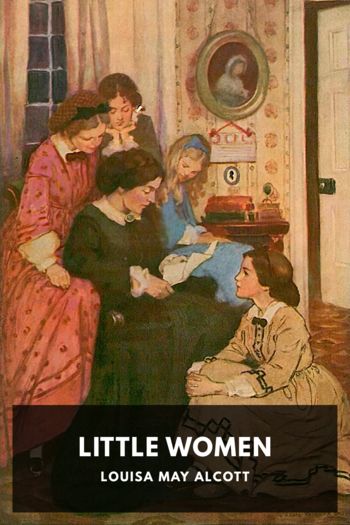Little Women - Louisa May Alcott (the beach read .TXT) 📗

- Author: Louisa May Alcott
Book online «Little Women - Louisa May Alcott (the beach read .TXT) 📗». Author Louisa May Alcott
She knew her husband’s income, and she loved to feel that he trusted her, not only with his happiness, but what some men seem to value more—his money. She knew where it was, was free to take what she liked, and all he asked was that she should keep account of every penny, pay bills once a month, and remember that she was a poor man’s wife. Till now, she had done well, been prudent and exact, kept her little account-books neatly, and showed them to him monthly without fear. But that autumn the serpent got into Meg’s paradise, and tempted her, like many a modern Eve, not with apples, but with dress. Meg didn’t like to be pitied and made to feel poor; it irritated her, but she was ashamed to confess it, and now and then she tried to console herself by buying something pretty, so that Sallie needn’t think she had to economize. She always felt wicked after it, for the pretty things were seldom necessaries; but then they cost so little, it wasn’t worth worrying about; so the trifles increased unconsciously, and in the shopping excursions she was no longer a passive looker-on.
But the trifles cost more than one would imagine; and when she cast up her accounts at the end of the month, the sum total rather scared her. John was busy that month, and left the bills to her; the next month he was absent; but the third he had a grand quarterly settling up, and Meg never forgot it. A few days before she had done a dreadful thing, and it weighed upon her conscience. Sallie had been buying silks, and Meg longed for a new one—just a handsome light one for parties, her black silk was so common, and thin things for evening wear were only proper for girls. Aunt March usually gave the sisters a present of twenty-five dollars apiece at New Year; that was only a month to wait, and here was a lovely violet silk going at a bargain, and she had the money, if she only dared to take it. John always said what was his was hers; but would he think it right to spend not only the prospective five-and-twenty, but another five-and-twenty out of the household fund? That was the question. Sallie had urged her to do it, had offered to loan the money, and with the best intentions in life, had tempted Meg beyond her strength. In an evil moment the shopman held up the lovely, shimmering folds, and said, “A bargain, I assure you, ma’am.” She answered, “I’ll take it;” and it was cut off and paid for, and Sallie had exulted, and she had laughed as if it were a thing of no consequence, and driven away, feeling as if she had stolen something, and the police were after her.
When she got home, she tried to assuage the pangs of remorse by spreading forth the lovely silk; but it looked less silvery now, didn’t become her, after all, and the words “fifty dollars” seemed stamped like a pattern down each breadth. She put it away; but it haunted her, not delightfully, as a new dress should, but dreadfully, like the ghost of a folly that was not easily laid. When John got out his books that night, Meg’s heart sank, and for the first time in her married life, she was afraid of her husband. The kind, brown eyes looked as if they could be stern; and though he was unusually merry, she fancied he had found her out, but didn’t mean to let her know it. The house-bills were all paid, the books all in order. John had praised her, and was undoing the old pocketbook which they called the “bank,” when Meg, knowing that it was quite empty, stopped his hand, saying nervously—
“You haven’t seen my private expense book yet.”
John never asked to see it; but she always insisted on his doing so, and used to enjoy his masculine amazement at the queer things women wanted, and made him guess what “piping” was, demand fiercely the meaning of a “hug-me-tight,” or wonder how a little thing composed of three rosebuds, a bit of velvet, and a pair of strings, could possibly be a bonnet, and cost five or six dollars. That night he looked as if he would like the fun of quizzing her figures and pretending to be horrified at her extravagance, as he often did, being particularly proud of his prudent wife.
The little book was brought slowly out, and laid down before him. Meg got behind his chair under pretence of smoothing the wrinkles out of his tired forehead, and standing there, she said, with her panic increasing with every word—
“John, dear, I’m ashamed to show you my book, for I’ve really been dreadfully extravagant lately. I go about so much I must have things, you know, and Sallie advised my getting it, so I did; and my New-Year’s money will partly pay for it: but I was sorry after I’d done it, for I knew you’d think it wrong in me.”
John laughed, and drew her round beside him, saying good-humoredly, “Don’t go and hide. I won’t beat you if you have got a pair of killing boots; I’m rather proud of my wife’s feet, and don’t mind if she does pay eight or nine dollars for her boots, if they are good ones.”
That had been one of her last “trifles,” and John’s eye had fallen on it as he spoke. “Oh, what will he say when he comes to that awful fifty dollars!” thought Meg, with a shiver.
“It’s worse than boots, it’s a silk dress,” she said, with the calmness of desperation, for





Comments (0)